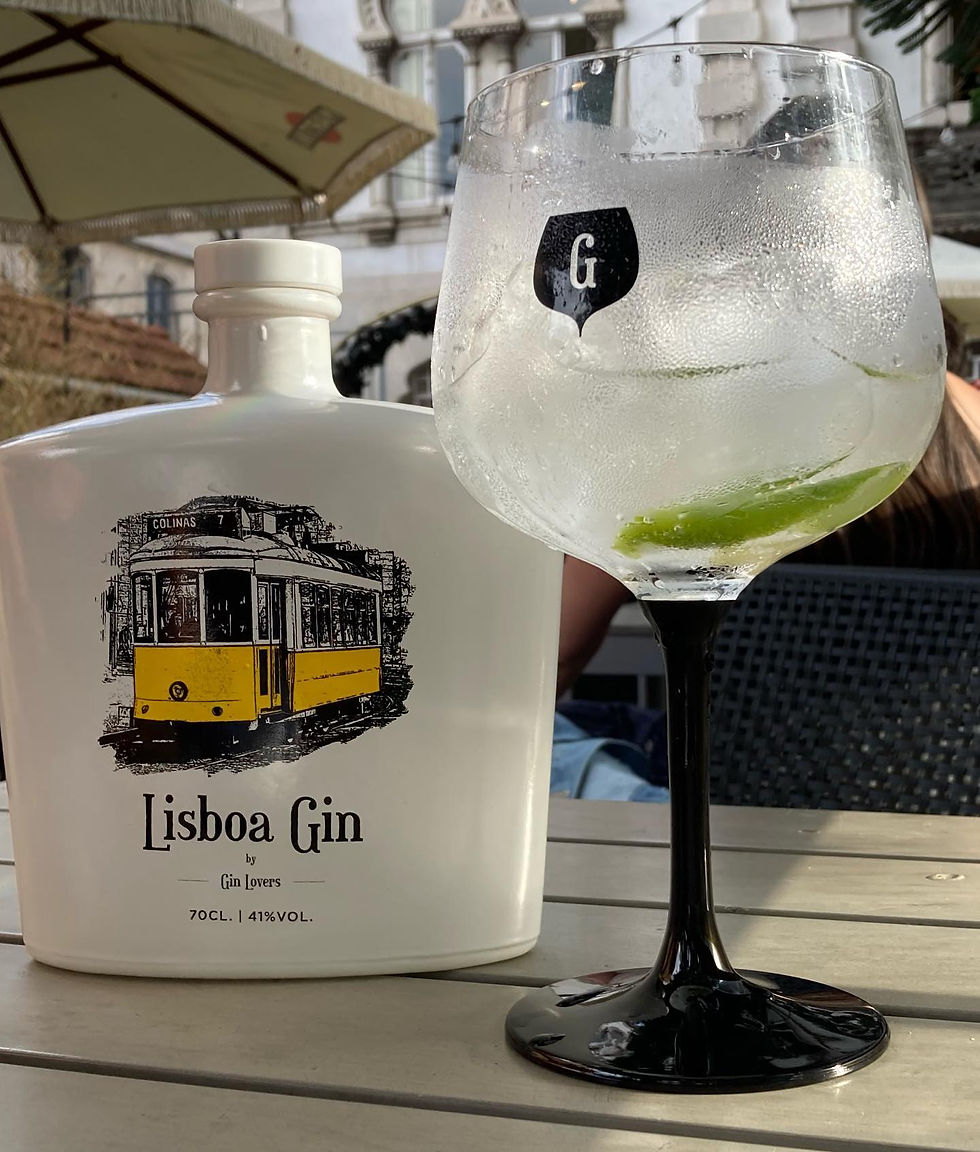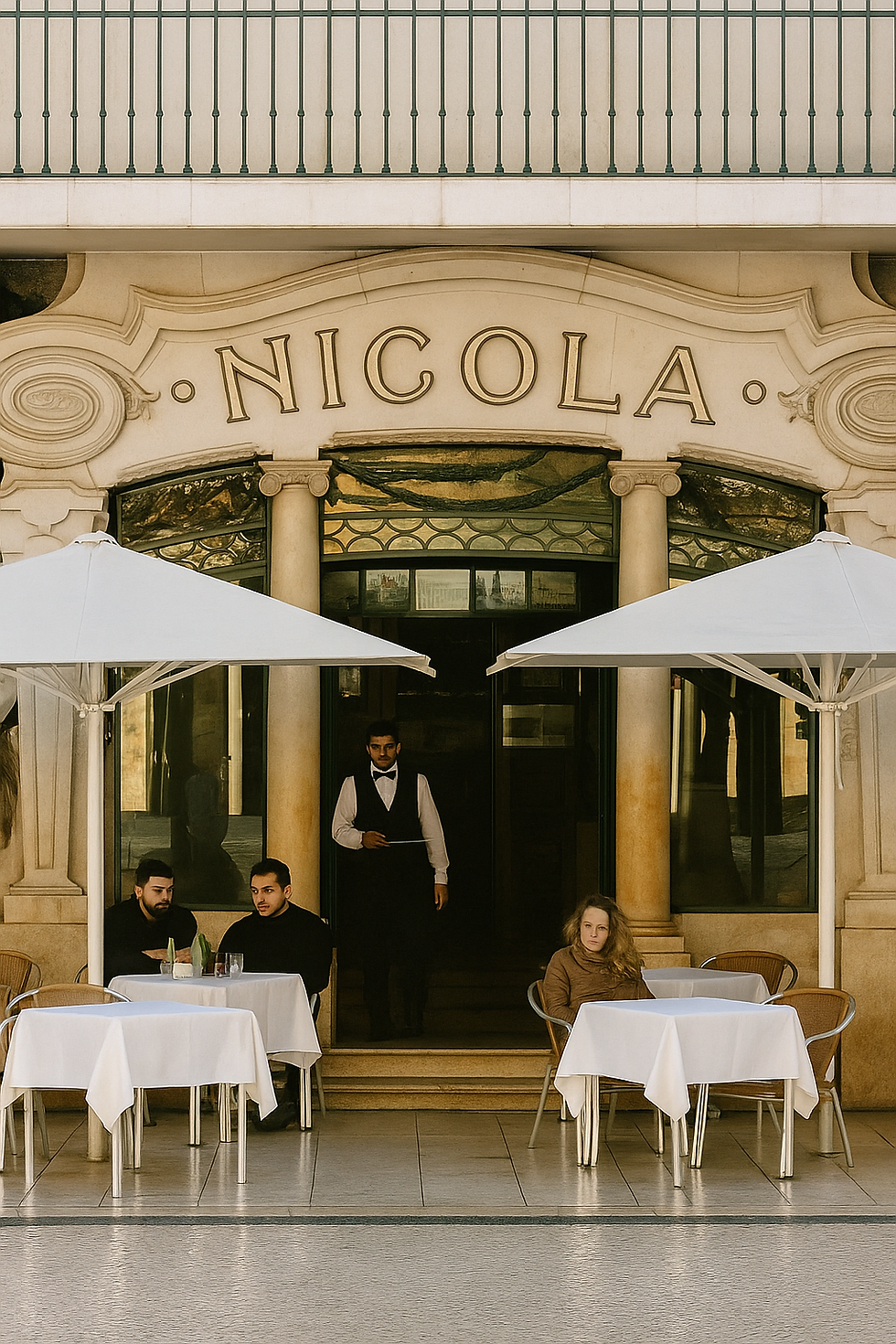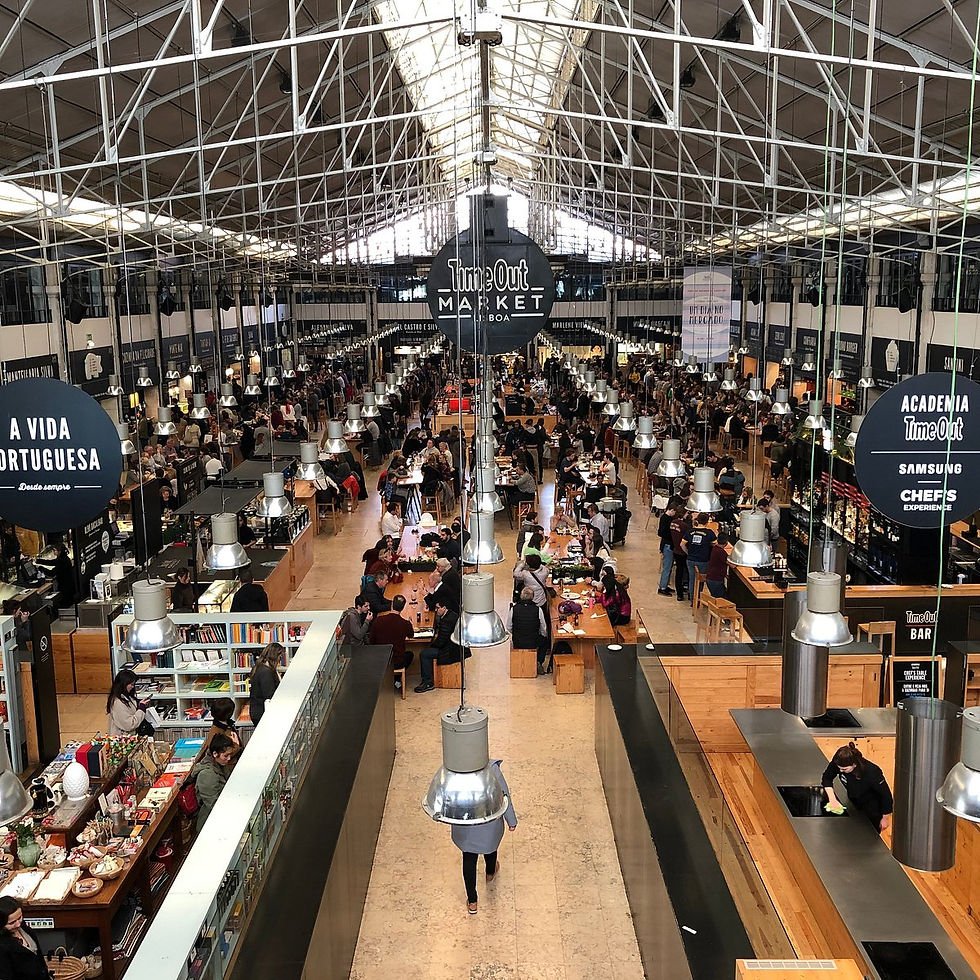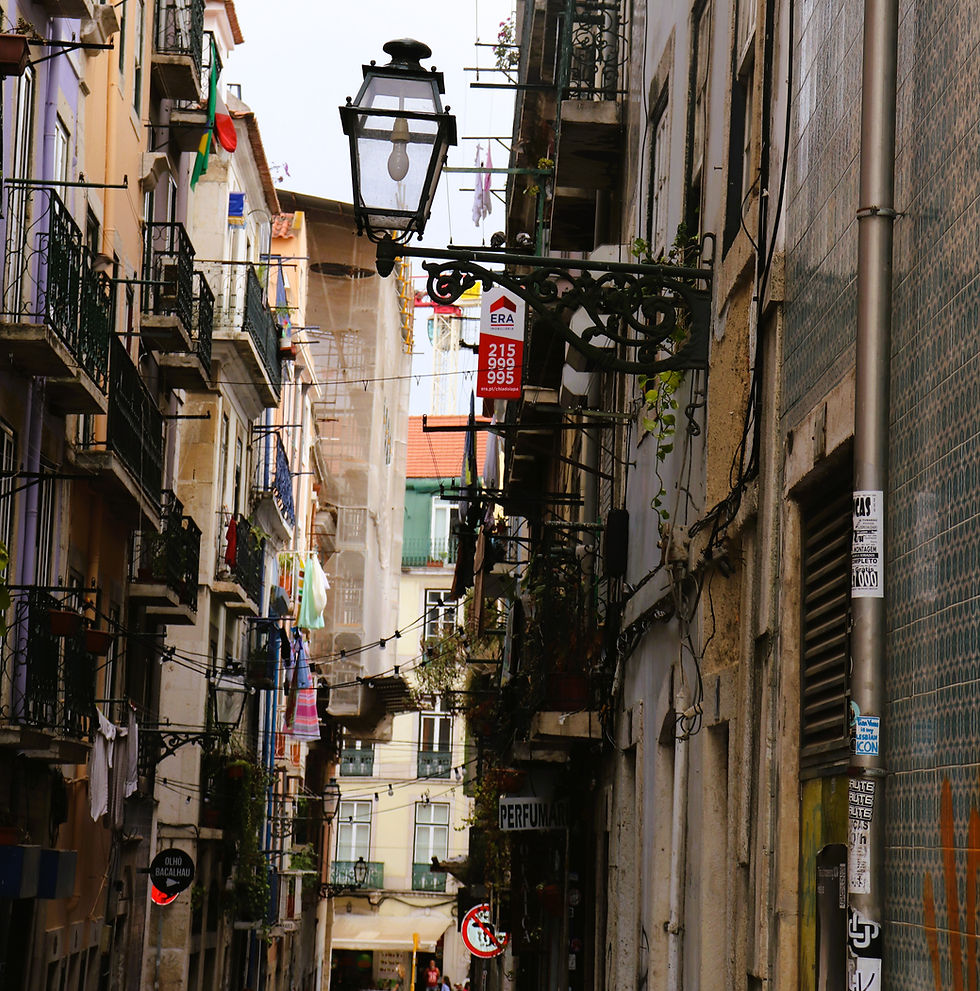Tascas to Taverns: A Deep Dive into Lisbon's Culinary Scene
- This Cafe Life

- Jun 26
- 10 min read
Updated: Sep 14
Lisbon and Portugal as a whole offer a culinary experience that’s both deeply rooted in tradition and refreshingly inventive. From sun-drenched coastal seafood to hearty inland stews, Portuguese cuisine celebrates bold, honest flavors with simple, high-quality ingredients.
At This Café Life, transparency matters. We want you to know that some of the links on our website are affiliate links. This means that if you click on a link and book travel, buy a product, or sign up for a service, we may earn a small commission — at no extra cost to you.

Recipes
Uniquely Portugal
Bacalhau (Salted Cod)
The cornerstone of traditional Portuguese cuisine. It’s not just a dish; it’s practically a national obsession. You’ll hear locals say there are 365 ways to prepare it—one for every day of the year (and many argue it’s more like a thousand). Bacalhau has been part of Portuguese cuisine since the Age of Discovery. Portuguese sailors needed a reliable, long-lasting protein for sea voyages, and salted, dried cod - often sourced from Newfoundland and Norway - was perfect. Even though it’s not native to Portuguese waters, it became deeply woven into the country’s identity. Bacalhau is hearty, humble, and versatile - it appears everywhere from Christmas Eve dinners and family feasts to upscale restaurants and street-side snack bars. It’s also a symbol of Portugal’s resourcefulness and resilience, honoring its maritime past while continuing to inspire chefs today. Before it hits the table, bacalhau is soaked for 24 to 48 hours in fresh water to rehydrate and remove the salt. Once revived, its texture becomes incredibly flaky and rich, and it absorbs flavors beautifully.
Conservas,(Tinned Seafood)
Deeply woven into Portuguese culinary culture - valued not just for its convenience but for its artisanal quality, history, and sheer variety. These preserved delicacies are enjoyed as petiscos, in gourmet tastings, and even as gifts, often presented in vibrant, vintage-style tins that reflect both tradition and design flair. What sets Portuguese conservas apart is the diversity of fish and seafood used, all carefully cooked, hand-packed, and preserved in olive oil, tomato sauce, escabeche, or spiced marinades. Some of the most popular types include: Sardinhas (Sardines), Cavala (Mackerel), Atum (Tuna), Polvo (Octopus), Lulas (Squid), Enguias (Eel), Mexilhão (Mussels) and Amêijoas (Clams).
Local Specialties
Fish & Seafood
Portuguese cuisine features a diverse and abundant array of seafood, thanks to the country’s long Atlantic coastline and deep-rooted fishing culture. Here’s some of the most commonly used seafood in traditional and modern Portuguese cooking:
Sardinhas (Sardines)

Robalo (Sea Bass)
Dourada (Sea Bream)
Polvo (Octopus)
Lulas (Squid)
Camarão (Shrimp)
Lagosta (Lobster)
Lavagante (Crayfish)
Sapateira (Stone Crab)
Amêijoas (Clams)
Mexilhão (Mussels)
Ouriços-do-mar (Sea Urchins)
Meat & Poultry
Portuguese cuisine may be famous for its seafood, but it also has a rich and diverse tradition of meat dishes rooted in the country’s rural heritage, Moorish influences, and regional pride. Here's a breakdown of the most notable meats and how they’re used in Portuguese cooking:
Porco (Pork) – The Star of the Land
Porco Preto (Iberian Black Pig)
Vaca (Beef)
Borreo (Lamb)
Cabrito (Goat)
Sausages & Charcuterie
Morcela (Blood sausage, often spiced with cumin and cinnamon.)
Presunto (Prosciutto - Presunto de Chaves & Presunto de Barrancos - prized varieties)
Chouriço & Linguiça (Smoked sausages made from seasoned pork)
Alheira (Garlicky sausage with bread & mixed meats -chicken, game, or pork)
Farinheira (A soft, smoky sausage with flour and pork fat)
Cheeses
Queijo da Serra (Creamy, tangy, sheep’s milk cheese.)
Azeitão (Soft, buttery sheep’s milk. Slightly funky flavor.)
São Jorge (Firm, slightly spicy cow’s milk. Aged versions are bold and nutty.)
Serpa (Strong-flavored, semi-soft sheep’s cheese - herbal infused.)
Requeijão (Fresh cheese made from whey, similar to ricotta.)
Traditional Dishes
Arroz de Marisco - Seafood rice stew with a mix of shrimp, clams, mussels, and lobster.
Caldeirada - Traditional fish stew made with multiple types of fish and shellfish.
Cataplana de Marisco - Cooked in a clam-shaped copper pot, loaded with seafood and aromatics.
Grilled Sardines (Sardinhas Assadas) - Charred and served with bread, salad, or potatoes.
Bolinhos de Bacalhau - Salt cod fritters, crunchy on the outside and soft inside.
Bacalhau à Brás - Shredded salted cod with onions, eggs, and straw potatoes.
Bacalhau com Natas - Oven-baked with cream, potatoes, and onions; ultimate comfort food.
Bacalhau à Gomes de Sá - Layers of cod, potatoes, onions, and eggs baked together.
Bacalhau assado - Simply grilled or roasted with garlic and olive oil.
Polvo à Lagareiro - Roasted octopus with garlic, olive oil, and potatoes.
Amêijoa à Bulhão Pato - Clams in a garlicky white wine and cilantro sauce.
Cozido à Portuguesa - The ultimate Portuguese meat stew, featuring a mix of boiled meats (pork, beef, chicken), blood sausage, chouriço, and vegetables all simmered in one pot. Hearty, rustic, and deeply traditional.
Carne de Porco à Alentejana - Pork with clams - one of Portugal’s most iconic dishes.
Caldo Verde - Soup with kale, potatoes, and chouriço.
Feijoadas - Winter stew with beans & pork.
Leitão - Roasted suckling pig,
Sandes de Leitão - Shredded roast suckling pig sandwich.
Bifana - A simple pork sandwich that’s packed with flavor.
Tostas Mistas - Grilled ham & cheese.
Pica-Pau - Beef or pork in a garlicky, mustardy sauce, served with pickles.
Bitoque - Steak with a fried egg on top,
Posta à Mirandesa - A thick, juicy beef steak from northern Portugal, usually grilled.
Frango Assado - Portuguese-style grilled chicken, spiced with piri-piri sauce.
Moelas - Tender chicken gizzards stewed in a savory, spiced sauce.
Cabidela - A rustic stew made with chicken and rice, thickened with a bit of the animal’s blood and vinegar (not for the faint of heart, but deeply traditional).
Arroz de Frango - Chicken rice—simple, flavorful.
Azeitonas Temperadas - Marinated olives with garlic, herbs, or citrus.
Tremoços - Lupin beans usually served cold and salted—great with a beer.
Peixinhos da Horta - Tempura-like green beans.
Batatas à Murro - Roasted Potatoes.
Desserts
Pastéis de nata - The most famous: a creamy custard tart with caramelized top, best warm.
Pão de Ló - A spongy egg-based cake, often moist in the center.
Arroz Doce - Creamy rice pudding with lemon zest and cinnamon.
Pastel de feijão - Almond cake.
Wines & Spirits
Spirits
In Lisbon, the gin and tonic isn’t just a cocktail—it’s a cultural moment. A refreshing drink made better with aromatic garnishes like fresh herbs, citrus, peppercorns, berries or flowers.
Ginjinha is a cherry liqueur you’ll find in tiny street-side bars - drink it like the locals, in a shot glass with a cherry at the bottom.
Wines
Portugal is one of the world’s oldest and most diverse wine-producing countries, with over 250 native grape varieties and a wide range of wine styles - from crisp whites to bold reds, to sparkling wines.
Vinhos Tintos (Red Wines)
Douro - Bold, structured, from Touriga Nacional and Tinta Roriz. Known for deep reds and Port.
Alentejo - Rich, smooth reds with ripe fruit and soft tannins. Warm climate = bold flavors.
Dão - More elegant and earthy reds from granite soils; often age-worthy.
Bairrada - Known for the Baga grape, producing robust, tannic reds with good acidity.
Vinhos Brancos (White Wines)
Vinho Verde (Minho region) - Light, crisp, and often slightly effervescent.
Douro & Dão - Whites here tend to be fuller-bodied, with minerality and citrus notes.
Bucelas - A small DOC near Lisbon, known for fresh, aromatic whites made from Arinto.
Espumante (Sparkling Wines)
Produced especially in Bairrada, Portugal’s top sparkling region. Traditional method (like Champagne), often using native grapes like Baga or Maria Gomes.
Fortified Wines
Portugal has a long and distinguished history with fortified wines, most famously Port and Madeira, both of which reflect the country’s deep maritime and colonial heritage. These wines emerged during the Age of Discovery, when Portuguese merchants needed a way to preserve wine on long sea voyages. By adding distilled grapes (aguardente) to halt fermentation, it increased shelf life, creating rich, stable wines with higher alcohol content and deep complexity.
Port Wine - From the Douro Valley, this is Portugal’s most famous wine. Styles include Ruby, Tawny, LBV (Late Bottled Vintage), and Vintage Port.
Madeira – Aged through exposure to heat and movement, developing a unique character, with styles ranging from dry to sweet (Sercial to Malvasia).
Moscatel de Setúbal – A sweet, fortified wine made from Muscat grapes.
Types of Dining Establishments
Petiscos - Small plates meant for sharing,
Tasca - A small, often family-run traditional eatery - the kind of humble, no-frills spot where locals gather for honest, home-cooked food and a glass of wine or beer. Think cozy interiors, handwritten menus, and hearty dishes. Prices are usually modest, portions are generous, and the atmosphere is laid-back and authentic.
Marisqueira - A seafood restaurant, often specializing in fresh shellfish like clams, shrimp, crab, and lobster.
Cervejaria - Originally a beer hall, pub or tavern, now often a lively spot for seafood, steaks, and petiscos. Beer is a focus, but food is solid.
Churrasqueira - A grill house specializing in grilled meats & poultry.
Taberna - A rustic tavern-style place, often smaller and more informal than a full restaurant. Think wine, petiscos, and a cozy vibe.
Café - Casual, all-day spots with everything from espresso, pastries to light meals, sandwiches, and beer.
Pastelaria - Pastry shop or bakery café. These places serve sweet and savory items.
Favorite Lisbon Restaurants by Neighborhood
Alfama
Alfama Cellar - Famous for its outstanding seafood

rice, this charming venue presents a contemporary twist on Portuguese classics.
O Segredo D’Alfama - A family-run gem that combines hearty Portuguese cuisine with intimate Fado performances.
Lisbon Tu e Eu - Tucked away in a charming alley, traditional dishes in a warm, friendly atmosphere
Taberna Sal Grosso - A rustic eatery with Mediterranean-inspired dishes.
Mesa de Frades - Set inside a former chapel, this spot offers an elegant dining experience with live Fado.
Casa Sao Miguel - Irresistible Cafe with pastries.
Bar O Pote - Small, authentic bar favored by locals. Offers wines, beers, and simple snacks
Baixa

Café Nicola - Opened over 200 years ago one of the most famous coffee shops in Lisbon.
Bastardo - Cool & Hip, in the Internacional Design Hotel.
Delfina - Small plates or mains draw locals and visitors alike.
Gambrinus - Around for almost nine decades, Gambrinus has plenty of historical drama in its decor, including arched wooden ceilings and stained-glass depictions of beer-swilling royals.
A Ginjinha Espinheira - Open since 1840, when the Galician Francisco Espinheira became the first purveyor of the spirit in Lisbon, the bar serves the sweet drink with or without cherries.
Restaurant Sala - João Sá, whose modern Portuguese cuisine won him a Michelin star in 2024. He draws on Asian cuisines to create tasting menus that excite both visually and in their combinations of flavors and textures.
Bairro Alto
BAHR - Bohemian & irreverent Will not disappoint.
Padaria de São Roque - Cathedral of Bread. Amazing interior.
Lisboa à Noite - A standout with upscale dining, Italian food & wine.
O Trevo - Great for a quick beer and sandwich.
Taberna do Bairro Alto - Humble, unassuming, amazing food!
Padaria do Bairro - A Lisbon institution; breads and sweets.
Cervejaria Ramiro - Iconic seafood restaurant -an authentic dining experience.
100 Maneiras Restaurant - Michelin Star tasting menus from Chef Ljubomir Stanisic.
Chiado
A Taberna da Rua das Flores - Cozy petiscos joint - small daily-changing plates.
Sacramento do Chiado - IIn an old, vaulted palace. Traditional Portuguese with a modern twist.
Cantinho do Avillez - Celeb chef José Avillez.. Tasty, casual. Perfect.
Alma - Prestigious & soulful fine dining from Michelin chef Henrique Sá Pessoa.
Belcanto - Avillez’s two Michelin star flagship, ranked among the world’s best,
Bairro do Avillez - Multi-concept venue: tapas-style Taberna, Páteo, pizzeria, & gourmet shop—all in one.
Príncipe Real

Lisboa Gin Restaurant and Bar (Gin Lovers Bar & Restaurant) - A favorite - they've combined a bar, restaurant, and gin shop all in one. Over 60 gin brands available, and a wide selection of gin-based cocktails or wines. The menu has contemporary Portuguese cuisine, ranging from full meals to traditional snacks, all designed to pair well with their extensive gin offerings. The outdoor terrace is perfect.
Copenhagen Coffee Lab - Excellent specialty coffee with cozy Scandinavian vibes.
Pavilhão Chinês - An eccentric bar-museum packed with collectibles, toys, and an old-world atmosphere.
A Cevicheria - Modern Peruvian cuisine with a Portuguese twist by Chef Kiko.
O Botânico - A fresh, greenery-filled vegan bistro behind the Natural History Museum.
Tapisco - Small plates blending Portuguese and Spanish flavors by acclaimed chef Henrique Sá Pessoa.
Black Sheep Lisboa - Deep selection of wines exclusively dedicated to small independent producers
Atalho Real - Specializes in grilled meats. Eclectic setting.
Cais do Sodré

Sol e Pesca - Casual seafood & canned fish in a former fishing tackle shop.
Pharmácia - Quirky restaurant and cocktail bar in the Pharmacy Museum with views over the river.
Pensão Amor - A decadent bar that used to be a brothel, now filled with vintage décor, burlesque vibes, strong drinks.
A Taberna da Rua das Flores - Small, often crowded spot serving elevated small plates.
Mercado da Ribeira / Time Out Market - Busy market with multiple choices for food & drink,
Oitava Colina - A local craft brewery known for its unique beers.
O Pitéu da Graça - Beloved local spot for traditional dishes. Unpretentious, affordable, always fresh.
Graça do Vinho - Small, atmospheric wine bar with great Portuguese wines, cheeses, and petiscos.
Via Graça - Elegant dining with panoramic views.
Jardim de Graça - Good for brunch, coffee, or a quick bite.
Bar da Graça (Miradouro kiosk) - A must for drinks with a view: while watching the sunse.
Estrela da Graça Pastelaria - Grab a pastel de nata and espresso in this classic local pastry shop.
Mouraria

Zé da Mouraria - Classic dishes like bacalhau à brás, grilled meat, and fish. Very popular with locals.
Zé da Mouraria 2 - A modern, more spacious version of the original
O Trigueirinho - Tiny, traditional, family-run, Affordable daily dishes, friendly vibe, homemade desserts.
Cantinho do Aziz - Mozambican-African cuisine, Spicy curries, grilled meats, vegetarian options.
The Food Temple - Vegetarian, creative small plates.
Maria da Mouraria (Fado Restaurant) - Traditional food ln the former home of Maria Severa.
Belém
Enoteca de Belém - Laid-back wine bar with tasty petiscos in a space behind the Monastery.
O Frade - Michelin Bib Gourmand – Alentejo-cuisine. Small, counter-style dining with great energy.
Canalha - Chic seafood bistro led by Michelin-trained chef João Rodrigues.
Taberna dos Ferreiros - A cozy, budget‑friendly tavern known for classic Portuguese dishes.
À Margem - Sleek, minimalist riverside café, Ideal for wine, coffee, or light bites with a waterfront view
Pastéis de Belém - Iconic home of pastéis de nata since 1837. Worth the hype.
Intendente
Ramiro - Legendary seafood spot — expect a line, but it's worth it.
Josephine Bistrô & Bar - Stylish French Portuguese bistro with brunch, dinner, and great cocktails.
O das Joanas - Cozy café with vegetarian-friendly dishes and neighborhood vibes.
Infame (at 1908 Lisboa Hotel) - Beautiful space, modern, eclectic menu and elegant cocktails.
Brick Café - Relaxed brunch and lunch spot with a rustic, plant-filled interior.
Dois Corvos Intendente - Local craft beer bar from the famous Lisbon brewery.
Lisbon isn’t a place to rush through—it’s a city to feel. It’s for long walks, lingering dinners, spontaneous music, and unexpected views. Whether you’re here for the history, the food, the people, or the mood, Lisbon invites you to slow down and stay a while.
Because once you’ve been, it’s hard not to fall in love.
Planning your Lisbon stay?
Our handpicked hotels, boutiques, and charming neighborhood finds - Where to Stay Guide.
Need a listing of highlights to plan your stay? - Lisbon Museums, Lisbon Churches, Street Art
Explore other districts here: Baixa, Alfama, Graça, Cais do Sodré, Principe Real, Chiado, & Bairro Alto
Running This Café Life involves time, hosting, and resources. Affiliate partnerships allow us to keep sharing in-depth travel guides, recipes, photography, and cultural stories with you for free.



Comments